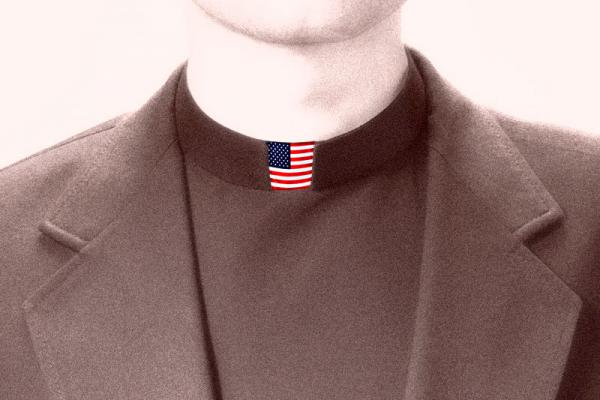During the 2004 presidential election season, Sojourners put out a bumper sticker with these words: “God Is Not a Republican, or a Democrat.” The number of orders was overwhelming and we kept running out. The simple message struck a chord among many Christians who were tired of the assumptions and claims by the Religious Right that God was indeed a Republican, or at least voted a straight-party ticket for the GOP. They also absurdly implied — and sometimes explicitly stated — that faithful Christians couldn’t support Democratic candidates. We said that voting was always an imperfect choice in a fallen world, based on prudential judgments about how to best vote our values, that people of faith would always vote in different ways — and that was a good thing for a democracy and the common good.
Our efforts appeared to inject some common sense into our nation’s political discourse, but given recent electoral statements and newspaper ads from some conservative Christian leaders, it appears the message bears repeating — God is still not a Republican or Democrat.
Politics always desires to make a handmaiden of religion. And the voice of prophetic faith witnessing to God’s intentions for the world’s present and future always seems difficult to hear amid the noisy clamor of political rhetoric. We’ve watched these dynamics, and participated in them, for four decades. During this presidential campaign, we lament the way in which religious faith has been abused, manipulated, and neglected in the heated, focus-group-tested sound bites that fill our airwaves and pass for “substantive” policy debates.
Further, the ways in which a few conservative evangelical leaders have allowed their political ideology to trump fidelity to the whole witness of the Bible is dismaying. When we hear some proclaim that voting “biblical values” only means voting against abortion and same-sex marriage, we wonder what Bible they are reading. Apparently, not the one in our hands — the one with 2,000 verses about the poor and marginalized, injunctions to regard the earth as God’s precious gift to us that we must carefully steward, and appeals to the efficacy of peacemaking rather than the an idolatrous trust in military might — all values that come from the Scriptures.
A small litany of conservative evangelical voices are loudly proclaiming that Christians should vote for “values” by defining the “sanctity of life” in ways that conveniently mesh with the political agenda of right-wing Republicans, focusing exclusively on abortion while leaving many other “life” issues outside of Christian concern and even calling all the other issues “negotiable.”
Early in the Republican primary, some conservative evangelical leaders argued that Christians shouldn’t vote for a Mormon and even referred to that religion as a “cult.” Being a Mormon should never disqualify Republican Mitt Romney from being president or fellow Mormon, Harry Reid from being the Democratic Majority Leader of the Senate. The U.S. Constitution makes clear that there can be no religious test for public office. We are a pluralistic nation and should judge candidates on their expressed moral compass, leadership, and policy proposals.
But, it has been ironic, to say the least, that the very conservative evangelicals who have long expressed deep disagreements with Mormon teachings have quickly have put their theological concerns aside and noticeably silenced their objections. The fact that some very visible conservative evangelical leaders have suddenly scrubbed their websites of any negative references to Mormonism seems more political than a sincere change of heart toward acknowledging the sincerity and legitimacy of another person’s religious beliefs. Apparently when their religious beliefs and political ideology come into conflict, partisan politics triumphs.
The contrast is even more stark as President Barack Obama has been more openly and repeatedly expressive of Christian faith than any president probably since Jimmy Carter. One can only wonder what those evangelical leaders would be saying about the Mormon faith if the Democratic candidate for president was a Mormon, and the Republican a Christian who publicly shares how Christ claims his allegiance.
We are evangelicals too, and believe that values are central to the choices we face in this election, and that religious faith is supposed to shape how an adherent responds to matters of human life from the beginning until the end, the dignity and priority of the poor and most vulnerable, the common good of society, and the urgent need to resolve so many international conflicts.
For Americans who claim an allegiance to Christian faith, we simply plea for a reading of the whole Bible when they reflect on how their faith may influence their vote. Much is at stake, and not just on one or two issues, including the fate of immigrant “aliens and sojourners” in our land, the hunger of one-in-five children, our growing and crippling economic inequality, the stubborn and unforgivable rates of poverty in our society, the deterioration of the earth’s life-sustaining capacities, and the fragile chance for peace in the Middle East and other dangerous places.
To be sure, a biblically prophetic voice will never be content with the performance of any president, and it shouldn’t be. But it’s an obligation to speak clearly and consistently into the deafening cacophony of this presidential campaign and expect that people of faith truly do vote the values — all of the values — of their faith. And because no candidate or party comes close to expressing all of our values, we need to respect the different choices that Christians make. For all of us believers, we pray that acts of citizenship may reflect, above all else, allegiance to a vision announcing that God’s love and justice continually seeks ways to break into this world.
Jim Wallis is President and CEO of Sojourners and a New York Times Best-Selling Author.
Wesley Granberg-Michaelson served as General Secretary for the Reformed Church in America from 1994 to 2011 and previously was Legislative Assistant to Senator Mark O. Hatfield.
Got something to say about what you're reading? We value your feedback!
